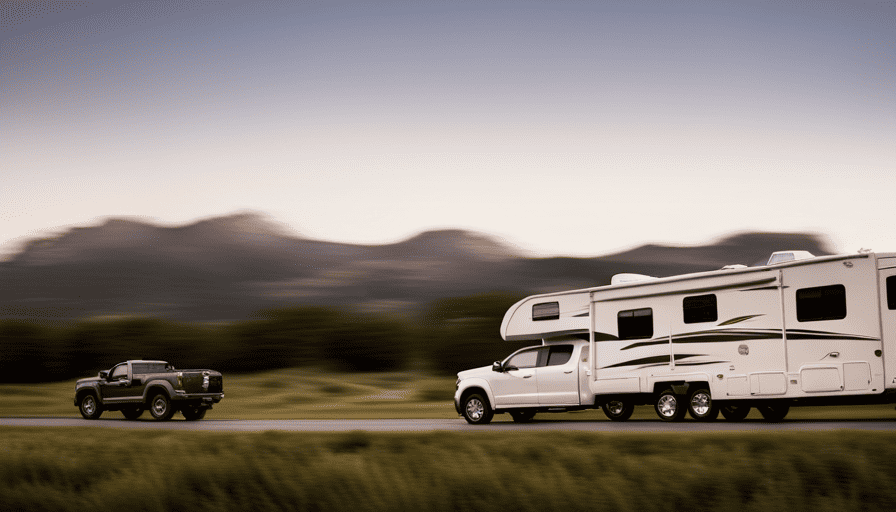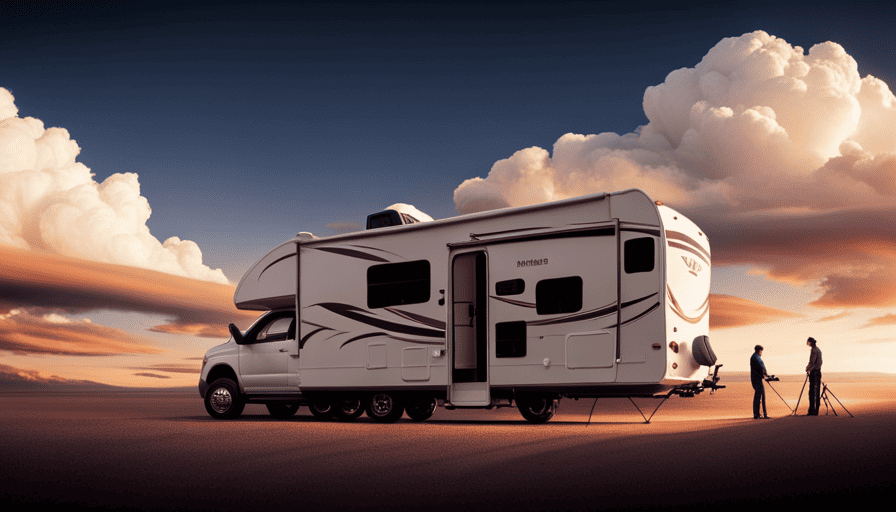The saying ‘Know your limits, but push beyond them’ is very relevant. This is especially true when towing a camper with a half-ton truck. It is crucial to understand the capabilities of your vehicle to ensure a safe and enjoyable trip.
In this informative and detailed article, we will explore the factors that determine the size of the camper you can safely pull with your truck.
First and foremost, it’s essential to consider your truck’s towing capacity. Understanding this limit will help you match the right size camper to your vehicle.
Additionally, you need to check the hitch and towing equipment for compatibility and ensure the presence of trailer brakes for optimal stopping power.
Terrain, driving conditions, and fuel efficiency are also important factors to consider. And let’s not forget about payload capacity – overloading your truck can lead to serious consequences.
Lastly, consulting the manufacturer’s guidelines and seeking professional advice will provide expert input specific to your truck.
So, let’s dive into the details and make sure you’re well-equipped to embark on your camping adventures with confidence and safety.
Key Takeaways
- Knowing the truck’s towing capacity is crucial for safe towing with a 1/2 ton truck.
- Choose a camper within the truck’s towing limits to avoid overloading and ensure stability and braking efficiency.
- Proper weight distribution and use of weight distribution hitch are important for improved stability and control.
- Seek professional advice and consult manufacturer’s guidelines to understand the specific truck’s capabilities, limitations, and recommended equipment for safe towing.
Understanding Towing Capacities: Know Your Truck’s Limits
You need to know your truck’s towing capacities so you don’t push it beyond its limits and risk putting yourself and your loved ones in danger. Understanding trailer weight limits is crucial when it comes to towing with a 1/2 ton truck.
Before hooking up a camper, it’s essential to consult your truck’s owner’s manual or contact the manufacturer to determine its specific towing capabilities. This information will provide you with the maximum weight your truck can safely tow.
Towing capacities can vary greatly depending on factors such as engine size, transmission type, axle ratio, and suspension. It’s important to take all these factors into consideration to ensure you’re not exceeding your truck’s capabilities. Overloading your truck can lead to decreased stability, reduced braking efficiency, and potential damage to the vehicle’s components.
Once you know your truck’s towing capacity, you need to consider the weight of the camper you plan to pull. Matching the right size is crucial to ensure safe and comfortable towing. Campers come in various sizes and weights, so it’s essential to choose one that falls within your truck’s towing limits. Remember, a heavier camper will put more strain on your truck, affecting its performance and potentially compromising safety.
Considering the weight of the camper is just one step in determining how big of a camper you can pull with a 1/2 ton truck.
Consider the Weight of the Camper: Matching the Right Size
To ensure a safe towing experience, it’s important to consider the weight capacity of your 1/2 ton truck when selecting the appropriate size of the camper.
For instance, let’s say you have a 1/2 ton truck with a towing capacity of 8,000 pounds. In this case, you would want to choose a camper that weighs well within this limit to avoid exceeding the truck’s capabilities.
Matching the size of the camper to the towing capacity of your truck is crucial. If you select a camper that’s too heavy, you run the risk of overloading your truck, which can lead to decreased control, reduced braking abilities, and potential damage to the vehicle.
On the other hand, choosing a camper that’s significantly lighter than the truck’s towing capacity may result in poor stability and handling on the road.
To determine the appropriate size of the camper, you should consider factors such as the weight of the camper itself, as well as any additional cargo or passengers you plan to carry. It’s recommended to leave a safety margin and not push your truck’s towing capacity to its absolute limit.
In the next section, we’ll discuss how to check the hitch and towing equipment to ensure safety and compatibility with your 1/2 ton truck. This will further enhance your towing experience and provide peace of mind on the road.
Check the Hitch and Towing Equipment: Ensuring Safety and Compatibility
Inspecting the hitch and towing equipment is vital for ensuring a safe and seamless towing experience with my 1/2 ton truck. It guarantees compatibility and provides reassurance on the open road. When it comes to towing a camper, hitch compatibility and weight distribution are two key factors to consider.
To ensure hitch compatibility, I recommend consulting the towing capacity and tongue weight specifications provided by the vehicle manufacturer. This information will help determine the appropriate hitch class and weight capacity required for your camper. It’s important to choose a hitch that can handle the weight of your camper and distribute it evenly across the truck’s frame.
In terms of weight distribution, using a weight distribution hitch is highly recommended. This type of hitch helps distribute the weight of the camper more evenly between the truck and the trailer axles, improving stability and control while towing.
To grab your attention and simplify the information, here is a table summarizing hitch classes and their corresponding weight capacities:
| Hitch Class | Weight Capacity |
|---|---|
| Class 1 | Up to 2,000 lbs |
| Class 2 | Up to 3,500 lbs |
| Class 3 | Up to 5,000 lbs |
| Class 4 | Up to 10,000 lbs |
By ensuring hitch compatibility and utilizing a weight distribution hitch, you can confidently tow a camper that matches your 1/2 ton truck’s capabilities. Now, let’s move on to the next section and discuss the importance of trailer brakes: stopping power matters.
Know the Importance of Trailer Brakes: Stopping Power Matters
Make sure your towing setup includes trailer brakes – they’re essential for having the stopping power you need on the road. When towing a camper with a 1/2 ton truck, understanding the importance of trailer brakes becomes crucial.
Regular maintenance is key to ensuring brake performance. Just like your truck’s brakes, trailer brakes also require regular inspection and servicing to ensure they’re in good working condition. This includes checking the brake pads, rotors, and brake fluid levels. By keeping up with regular maintenance, you can be confident that your trailer brakes will perform effectively when you need them most.
To understand the braking system, it’s important to know its components and functionality. The trailer braking system consists of electric or hydraulic brakes that are activated when you apply the brakes in your truck. The trailer brakes work in tandem with your truck’s braking system, providing additional stopping power to the entire rig. Understanding how the trailer brakes work and how they integrate with your truck’s brakes can help you make informed decisions when it comes to towing a camper.
The importance of trailer brakes cannot be overstated when towing a camper with a 1/2 ton truck. Regular maintenance is essential for ensuring brake performance, and understanding the components and functionality of the braking system is crucial for safe towing. By taking these factors into consideration, you can have peace of mind knowing that your trailer brakes will provide the stopping power you need.
Now, let’s transition into the next section and consider the terrain and driving conditions for optimal handling and stability.
Consider the Terrain and Driving Conditions: Handling and Stability
Navigating different types of terrain and varying driving conditions is essential for ensuring optimal handling and stability while towing with your 1/2 ton truck and trailer. When considering the terrain factors, it’s important to take into account the following handling considerations:
-
Weight distribution: Properly distributing the weight of your camper is crucial for maintaining stability. Make sure to evenly distribute the weight between the front and rear axles of your truck to prevent swaying or fishtailing.
-
Uphill and downhill driving: When towing uphill, your truck may experience a decrease in power and speed. It’s important to choose the appropriate gear and maintain a steady speed to prevent strain on the engine. Downhill driving requires caution as well, as the added weight of the trailer can cause your truck to gain momentum. Utilize engine braking and keep a safe distance from other vehicles.
-
Windy conditions: Strong winds can significantly affect the handling of your truck and trailer. Reduce your speed and maintain a firm grip on the steering wheel to counteract the wind’s force.
-
Off-road terrain: If you plan on venturing off-road, consider the ground clearance of your truck and trailer. Be mindful of uneven surfaces, rocks, and obstacles that could potentially damage your vehicle or cause stability issues.
-
Wet or icy roads: Wet or icy roads can reduce traction and increase the risk of skidding. Drive at a slower speed, increase your following distance, and apply gentle brake pressure to avoid sliding.
In order to ensure a safe and smooth towing experience, it’s important to take these handling considerations into account. Moving forward, let’s explore how to calculate the gross combined weight rating (GCWR) to stay within the limits.
Calculate the Gross Combined Weight Rating (GCWR): Stay within the Limits
To ensure you stay within the limits, it’s crucial to accurately calculate the Gross Combined Weight Rating (GCWR) of your 1/2 ton truck and trailer.
The GCWR is the maximum weight that your truck and trailer can safely handle together. It takes into account the weight of the loaded truck, the loaded trailer, passengers, and any additional cargo.
To calculate the towing capacity of your truck, you’ll need to know its Gross Vehicle Weight Rating (GVWR) and its curb weight. The GVWR is the maximum weight that your truck can carry, including passengers and cargo. The curb weight is the weight of the empty truck, without any additional load. Subtracting the curb weight from the GVWR will give you the payload capacity of your truck.
Next, you need to consider the weight distribution of your trailer. Proper weight distribution is essential for safe towing. The tongue weight, which is the downward force exerted on the hitch by the trailer, should typically be around 10-15% of the total trailer weight. Distribute the weight evenly to ensure stability and prevent swaying.
Understanding the impact on fuel efficiency: the cost of towing is the next step.
Understand the Impact on Fuel Efficiency: The Cost of Towing
Consider the unexpected consequences of towing, such as the significant impact it can have on your fuel efficiency and overall cost.
When towing a camper with a 1/2 ton truck, it’s important to understand the effect it will have on your vehicle’s fuel consumption. Towing a heavy load puts additional strain on the engine, causing it to work harder and burn more fuel. This, in turn, leads to decreased fuel efficiency and increased costs at the pump.
Not only does towing decrease fuel efficiency, but it can also have a negative impact on your truck’s engine performance. The added weight of the camper puts a strain on the engine, which can result in decreased acceleration and overall power. Additionally, the increased load can cause more wear and tear on the engine, leading to higher maintenance costs over time.
To minimize the impact on fuel efficiency and engine performance, it’s important to properly maintain your truck. Regularly servicing the engine, changing the oil, and keeping the tires properly inflated can help improve fuel efficiency and reduce the cost of maintenance. Additionally, consider investing in aftermarket upgrades such as a high-flow air intake or a performance exhaust system, which can help improve engine performance while towing.
Taking into account the cost of maintenance and the impact on engine performance, it’s crucial to also consider the payload capacity of your truck when towing a camper. Overloading your truck can lead to safety issues and further strain on the engine. Therefore, it’s important to be mindful of the weight limits and not exceed the recommended payload capacity of your 1/2 ton truck.
Take into Account Payload Capacity: Don’t Overload Your Truck
When towing, it’s crucial to keep in mind the payload capacity of your truck and avoid overloading it. This means understanding the weight limitations that your truck can safely handle. Exceeding the payload capacity can lead to decreased control, increased stopping distances, and potential damage to your vehicle.
To help you better understand the importance of payload capacity considerations and weight distribution, let’s take a look at the following table:
| Truck Model | Payload Capacity (lbs) | Trailer Weight (lbs) | Tongue Weight (lbs) |
|---|---|---|---|
| Ford F-150 | 1,500 | 8,000 | 800 |
| Chevrolet Silverado 1500 | 1,600 | 9,000 | 900 |
| Ram 1500 | 1,700 | 7,500 | 750 |
| Toyota Tundra | 1,600 | 8,500 | 850 |
| Nissan Titan | 1,600 | 8,200 | 820 |
As you can see from the table, different truck models have varying payload capacities. It’s important to consider both the weight of your camper and the tongue weight (the downward force exerted on the hitch ball by the trailer) when determining if your truck can safely tow the camper.
Understanding your truck’s payload capacity and considering weight distribution is vital when towing a camper with a 1/2 ton truck. By avoiding overloading your truck, you can ensure safer and more efficient towing. Now, let’s move on to the next section and discuss the importance of consulting the manufacturer’s guidelines and following their recommendations.
Consult the Manufacturer’s Guidelines: Follow Recommendations
Following the manufacturer’s guidelines is essential for ensuring a smooth and safe towing experience with your 1/2 ton truck. The manufacturer’s recommendations provide valuable information about the towing capacity limits of your truck, which is crucial for selecting the right camper.
Here are some key points to consider:
-
Towing Capacity: The manufacturer’s guidelines will specify the maximum weight that your truck can tow safely. It’s important to stay within this limit to prevent overloading your vehicle and compromising its performance.
-
Payload Capacity: In addition to the towing capacity, the manufacturer’s recommendations will also include the payload capacity of your truck. This refers to the maximum weight that your truck can carry, including passengers, cargo, and the camper itself. Exceeding this limit can affect the stability and handling of your truck.
-
Weight Distribution: The manufacturer’s guidelines may provide suggestions on how to distribute the weight of the camper to ensure proper balance and stability. Following these recommendations will help maintain control of your truck while towing.
-
Additional Equipment: The manufacturer’s recommendations may also mention any additional equipment, such as trailer brakes or weight distribution hitches, that may be necessary for safe towing.
Consulting the manufacturer’s guidelines is crucial when determining the appropriate size of the camper to tow with your 1/2 ton truck. However, it’s always a good idea to seek professional advice and get expert input on your specific truck to ensure you make the best decision.
Seek Professional Advice: Get Expert Input on Your Specific Truck
To ensure the optimal performance and safety of your 1/2 ton truck while towing, it’s recommended that you consult with a professional who can provide expert advice tailored to your specific vehicle. This includes determining the best weight distribution and additional equipment needed. This guidance can greatly enhance your towing experience.
When it comes to determining the size of the camper you can safely pull with your 1/2 ton truck, seeking advice from a professional is crucial. While it may be tempting to rely solely on the manufacturer’s guidelines, consulting an expert can provide you with valuable insights and recommendations based on your truck’s specifications.
A professional will take into account factors such as your truck’s towing capacity, axle ratio, suspension, and braking system, among others. These experts will analyze all the technical details to ensure that you are towing within the safe limits of your vehicle.
Moreover, they can provide guidance on weight distribution, ensuring that the load is properly balanced to maintain stability and prevent excessive strain on your truck. They can also recommend additional equipment, such as sway control devices or weight distribution hitches, to further enhance safety and control while towing.
By seeking professional advice, you can have peace of mind knowing that you’re making informed decisions based on your specific truck’s capabilities and limitations. This will not only improve your towing experience but also prioritize the safety of yourself, your passengers, and other road users.
Frequently Asked Questions
What are the limits of my 1/2 ton truck’s towing capacity?
Understanding towing capacity limitations is crucial when considering the limits of my 1/2 ton truck’s towing capacity.
Several factors can affect towing performance, such as the truck’s engine power, transmission, axle ratio, and suspension.
Additionally, the weight distribution, trailer brakes, and hitch setup play a significant role.
It’s essential to consult the truck’s manufacturer guidelines and consider these factors to determine the safe towing capacity for my 1/2 ton truck.
How can I determine the right size camper to match the weight of my truck?
To determine the right size camper for your truck, first consider its weight capacity. This can be found in your truck’s manual or by researching online.
Next, calculate the towing ratio, which is the weight of the trailer compared to your truck’s towing capacity. This ratio should ideally be below 80% to ensure safe and efficient towing.
By determining these factors, you can confidently choose a camper that won’t strain your 1/2 ton truck.
What safety precautions should I take when it comes to the hitch and towing equipment?
When it comes to hitch maintenance and towing equipment, there are a few important safety precautions to keep in mind. Firstly, regularly inspect and maintain your hitch, ensuring it’s in good condition and securely attached.
Secondly, always follow the manufacturer’s guidelines for weight limits and towing capacity.
Lastly, be aware of towing speed limits and adjust your driving accordingly.
By taking these precautions, you can help ensure a safe and smooth towing experience.
Why are trailer brakes important and how do they affect stopping power?
Trailer brakes are crucial for safe towing and play a significant role in stopping power. Proper braking techniques, coupled with regular trailer brake maintenance, are essential to ensure optimal performance.
Trailer brakes provide additional stopping force, reducing the strain on the tow vehicle’s brakes and preventing potential accidents. They distribute the braking force evenly between the tow vehicle and trailer, improving stability and control.
Practicing proper braking techniques and maintaining trailer brakes are essential for a safe and efficient towing experience.
How does the terrain and driving conditions impact the handling and stability of towing a camper with a 1/2 ton truck?
When towing a camper with a 1/2 ton truck, the terrain and weather conditions can greatly impact handling and stability. Adverse weather conditions such as strong winds, rain, or snow can make the towing experience more challenging, affecting the truck’s traction and control.
Additionally, the weight distribution of the camper plays a crucial role in stability. Properly distributing the weight within the camper and ensuring it’s within the truck’s towing capacity is essential for safe and stable towing.
What is the Weight Limit for a Camper Trailer That Can Be Pulled by a 1/2 Ton Truck?
When considering a camper trailer for your 1/2 ton truck, it’s important to know the weight limit. Camper trailer weight specifications vary depending on the model and manufacturer. It’s crucial to research and find a camper trailer that falls within the towing capacity of your truck to ensure safe and comfortable travels.
Conclusion
In conclusion, knowing the towing capacity of your 1/2 ton truck is crucial when considering the size of the camper you can pull. Matching the weight of the camper to your truck’s capabilities, ensuring safety and compatibility with the hitch and towing equipment, and understanding the importance of trailer brakes are all essential factors to consider.
Additionally, taking into account the terrain, driving conditions, fuel efficiency, and payload capacity will help you make informed decisions. Remember, it’s always best to consult the manufacturer’s guidelines and seek professional advice to ensure a safe and enjoyable towing experience. As they say, knowledge is power, and in this case, it’s the key to successful towing.










